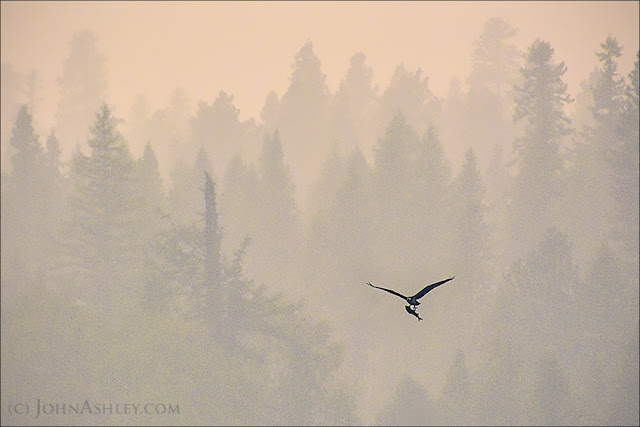 |
| An osprey flies away with fish in tow through smokey, western Montana skies. |
skip to main |
skip to sidebar

Natural history notes and photographs from the "last best place"

CURRENT MOON
Aurora Borealis Alerts
Climate Change Information
- Climate Change Q and A
- Capitalism & Climate Change
- Surging Seas Interactive
- What Will Disappear (sea level interactive)
- Climate Change Wizard (temperature interactive)
- Years of Living Dangerously
- Chasing Ice documentary trailer
- James Blalog's TED talk
- ClimateBites
- Evangelical Climate Scientist
- Catholic Climate Covenant
- PBS's "Climate of Doubt"
- Union of Concerned Scientists
- Climate Progress
Inconvenient Truth
"Giving scientists and climate change deniers equal time is like having tobacco executives debate doctors on the safety of cigarettes."
Senator Brian Schatz, Hawaii
Wild & Free MT Subjects
Alder
(3)
American Dipper
(1)
Amphibians
(6)
Animal Names
(1)
Antlers
(3)
Ants
(3)
Aphids
(1)
Arnica
(1)
Bald Eagles
(8)
Balsamroot
(1)
Bats
(4)
Bearberry
(2)
Beargrass
(1)
Bears
(9)
Bees
(1)
Beetles
(9)
Behavior
(46)
Bergamot
(1)
Bighorn Sheep
(2)
Birds
(74)
Bitterroot
(1)
Blanketflower
(1)
Bluebirds
(1)
Books
(1)
Buffleheads
(1)
Buttercups
(1)
Butterflies
(9)
Caterpillars
(3)
Chickadees
(4)
Chief Mtn
(3)
Clematis
(1)
Climate Change
(1)
Columbine
(1)
Comets
(7)
Coneflower
(1)
Coots
(2)
Cormorants
(1)
Cottonwoods
(1)
Coyotes
(2)
Cranes
(1)
Crayfish
(2)
Damselflies
(1)
Deer
(8)
Dogwoods
(3)
Douglasia
(1)
Dragonflies
(5)
Eclipse
(3)
Eggs
(1)
Exotic Species
(1)
Ferns
(1)
Fish
(4)
Flickers
(2)
Flies
(1)
Forget-me-nots
(1)
Froghoppers
(1)
Frogs
(2)
Gartersnakes
(1)
Geese
(1)
Glacier Lilies
(2)
Glacier Park
(22)
Goldeneyes
(5)
Grayling
(2)
Grebes
(2)
Grosbeaks
(1)
Grouse
(3)
Harebells
(1)
Harlequin Ducks
(6)
Hooded Mergansers
(6)
Horned Larks
(1)
Hornets
(1)
Horsetails
(1)
Huckleberries
(8)
Hunting
(2)
Ice and Snow
(7)
Indian-pipe
(1)
Insects
(37)
Invertebrates
(1)
Juniper
(1)
Killdeer
(1)
Kingfishers
(2)
Kinnikinnick
(2)
Ladybugs
(2)
Larch
(1)
Lewis and Clark
(10)
Locusts
(1)
Long-toed Salamanders
(4)
Loons
(5)
Lupines
(1)
Magpies
(1)
Mariposa Lily
(1)
Meadowlarks
(1)
Meteors
(6)
Mites
(3)
Moon
(19)
Moose
(5)
Moss
(1)
Moths
(18)
Mountain Lions
(1)
MT History
(15)
MT Places
(13)
Mushrooms
(1)
Night Sky
(22)
Northern Harriers
(1)
Northern Lights
(4)
Northern Pintails
(1)
Orchids
(1)
Osprey
(6)
Owl-clover
(1)
Owls
(6)
Pasqueflower
(4)
Phalaropes
(1)
Photography Tips
(3)
Plant
(1)
Plants
(38)
Pocket Gopher
(1)
Pond Lilies
(1)
Ponderosa
(2)
Rabbits
(2)
Raptors
(2)
Rattlesnakes
(1)
Ravens
(1)
Red-winged Blackbirds
(2)
Redpolls
(1)
Reptiles
(3)
Ring-necked Ducks
(1)
River Otter
(1)
Robins
(3)
Rodents
(1)
Roses
(2)
Sandpipers
(1)
Sapsuckers
(1)
Serviceberry
(1)
Shooting Stars
(1)
Skunk Cabbage
(1)
Snags
(1)
Snakes
(2)
Snipe
(2)
Spiders
(3)
Spittlebugs
(2)
Squirrels
(5)
Stink Bugs
(3)
Sunflowers
(1)
Swallows
(2)
Swans
(2)
Teasel
(1)
Thimbleberries
(1)
Treehoppers
(1)
Trillium
(3)
Turkeys
(3)
Turtles
(3)
Video
(7)
Wasps
(2)
Waxwings
(1)
Western Red Cedar
(1)
Wild Horses
(1)
Wildfire
(1)
Wildflowers
(25)
Willow
(1)
Wolves
(2)
Wood Ducks
(2)
Yarrow
(1)
Yellowbells
(1)
Yellowjackets
(1)
Montana Guides
Wild Montana Apps
Montana Places
Wild Country Ethics
U.S. BIRD REPORT LISTS
MT Conservation Organizations
MT Features Online
MT Wildfire Info & Maps
Lewis and Clark's blog
Comets, Eclises, Full Moons, Etc.
The Big Picture
- Free Online Classes (from MT!)
- The Overview Effect
- MT DonorsChoose.org
- Globe at Night Project
- Light Pollution Interactive
- Science Friday
- Encyclopedia of Life
- Misconceptions About Evolution
- What is Natural Selection?
- What is Evolution?
- What is a Gene?
- What is DNA?
- Stated Clearly
- Out of Eden Walk
- ARKive (Life on Earth)
- Natural History Book Reviews
- Encyclopedia of Life
- Biology News Net
- The Clergy Letter Project
- Montana Public Media
- US Wind Map
Submit your Photo for Expert Identification!
Natural History Reads
Where in the World
"Everything good in life is wild & free" (Thoreau)
What is Wild & Free MT?
Subscribe via email
John Ashley Fine Art
The photography blog
Contact John
Facebook
Subscribe via email
John Ashley Fine Art
The photography blog
Contact John
